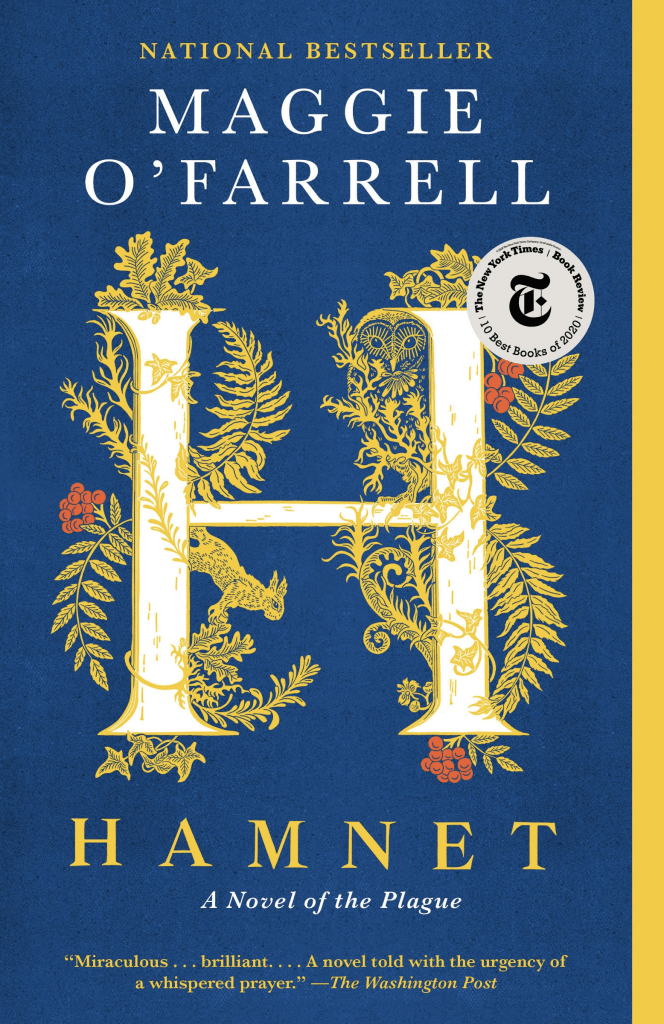
When a Latin tutor gazes out a window, barely listening to his charges recite their verb conjugations, his eye catches sight of a bewitching woman with a falcon on her arm. Suddenly taken with her, he extricates himself from his classroom duties and goes to find her, feels he needs to know who she is. He soon comes to learn that this woman, Agnes, has a sense not only of birds, but of so much of nature, human nature, and natural remedies – more than most. It is only when tragedy upends their lives when they both learn that one can only control so much of what happens in nature and that man will always have limitations.
Underneath this love story is also a fictional version of how the play, Hamlet, came to be written by William Shakespeare. The tutor, of course, is Shakespeare, and Hamnet is his son, a twin, who died at a young age of the Black Plague. The plot is vividly imagined and lovingly told, but it is no wonder that a tragedy was borne from it. It is a heart-wrenching story. And not to worry – even knowing this, there are still a few twists that keep the reader guessing until the very end.
For me, there was quite a bit of hype surrounding this book, which was maybe/maybe not deserved, so I don’t want to build it up for anyone else. But it is a worthwhile read, particularly if you like historical fiction.
I’d be very curious to hear what others felt about this one!

I just finished this book. I also had been drawn in by the hype.
As a twins mom, like you, the book tore at my heart strings. I thought some of the language was extraordinary, and I found myself rereading some sentences just to savor them. The author definitely brought the reader into the environment, but it was just so dark, so painfully sad… I thought Agnes was a very special character, beautifully imagined, and her connection to her brother was quite unique. It might’ve been a little more helpful to have a fuller understanding of Shakespeare’s experience in London… I was relieved that the author captured that final moment of understanding between Agnes and Shakespeare after they experienced their deep suffering so separately.
LikeLiked by 1 person
Beautifully said – and could not agree more. Thank you!
LikeLike
I just finished this, having bought it after reading her excellent memoir, I Am, I Am, I Am, Seventeen Brushes With Death.
I found that the hype and descriptions didn’t really relate to my reading of the novel. To me this wasn’t a novel about a playwright or his son, it was the story of an intriguing young woman, sought out by an unhappy younger man – and the way she affects the destinies of them all.
I loved the character of Agnes, the way O’Farrell imagines her, her self assuredness once she is out of the clutches of her stepmother, her enduring closeness with her brother Batholomew, her earthmother birthing practices, her intuitive abilities, her desire to see her husband find and pursue his purpose, despite the sacrifice she must make – in order to care for an ailing child.
I wondered why it was even called Hamnet and that big ‘H’ and it occurred to me that that is what draws people in, the curious, the marketing. Shakespeare, Hamlet, H – has a royal connotation too. Maybe it wouldn’t have been received in the same vein had it been titled Agnes, with a big ‘A’ like the house they lived in?
I was delighted to discover that the novel was very much about Agnes.
LikeLike
I apologize for not seeing this very thoughtful comment earlier. I could not agree with you more, although I believe that the final scene does give some redemption to the title/to Shakespeare himself just a tiny bit. I think that is the irony, though – the statement. Much of history is named for the men, right? And isn’t is so much about the women?
LikeLike